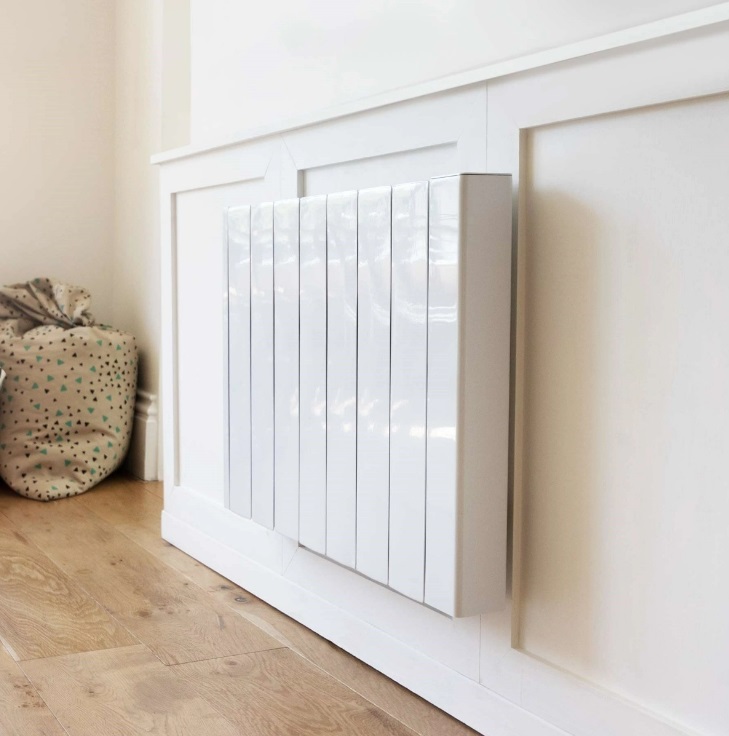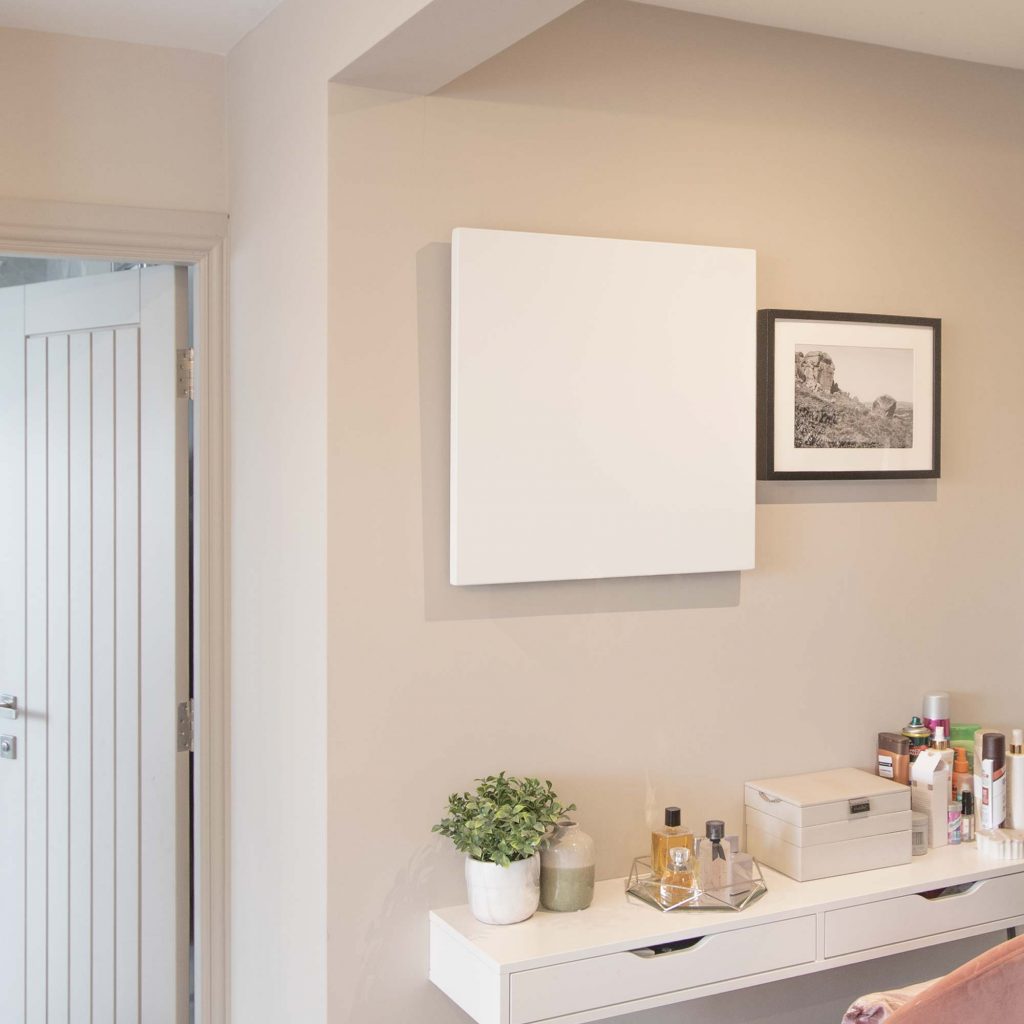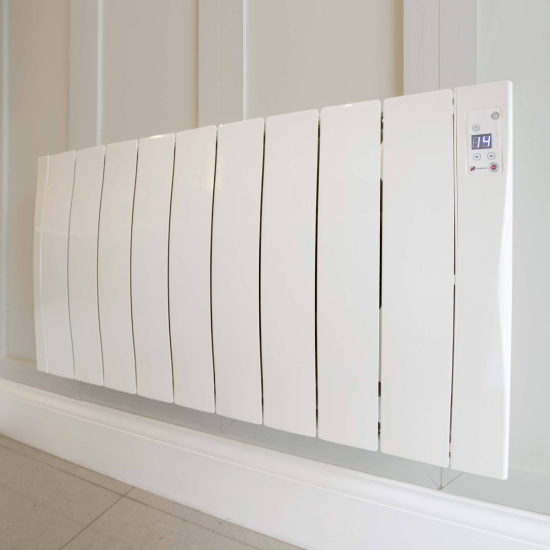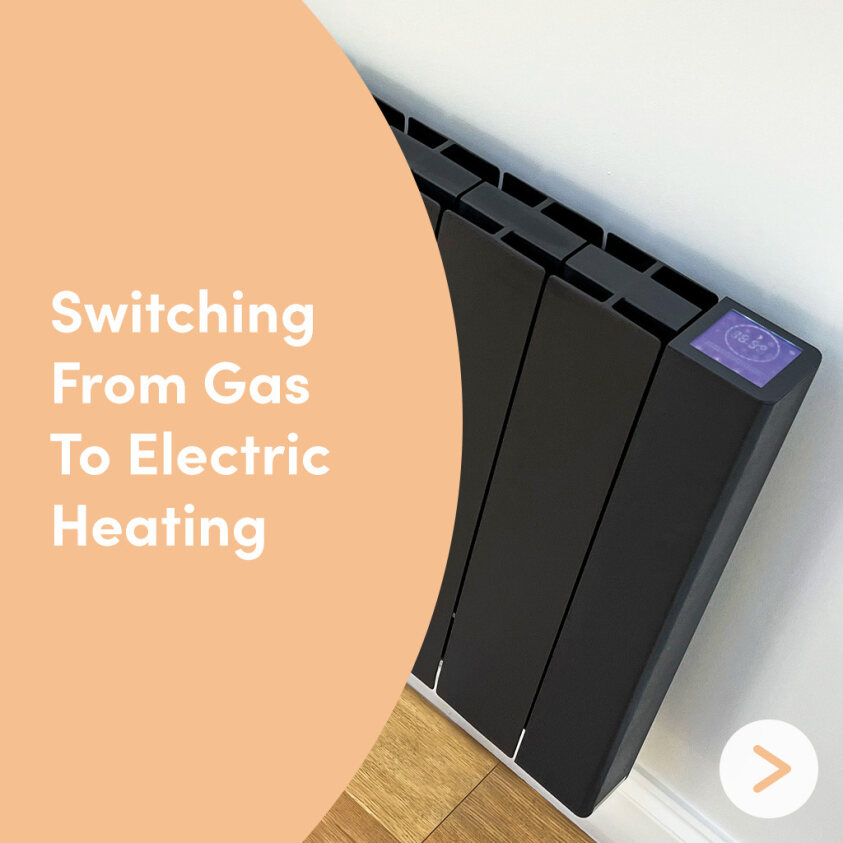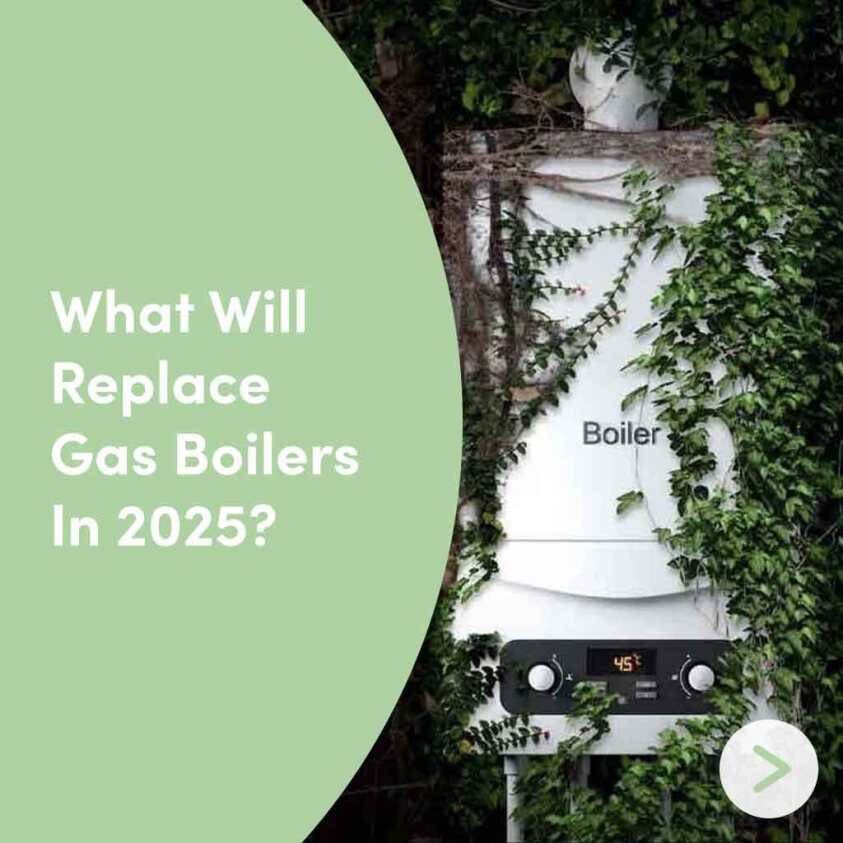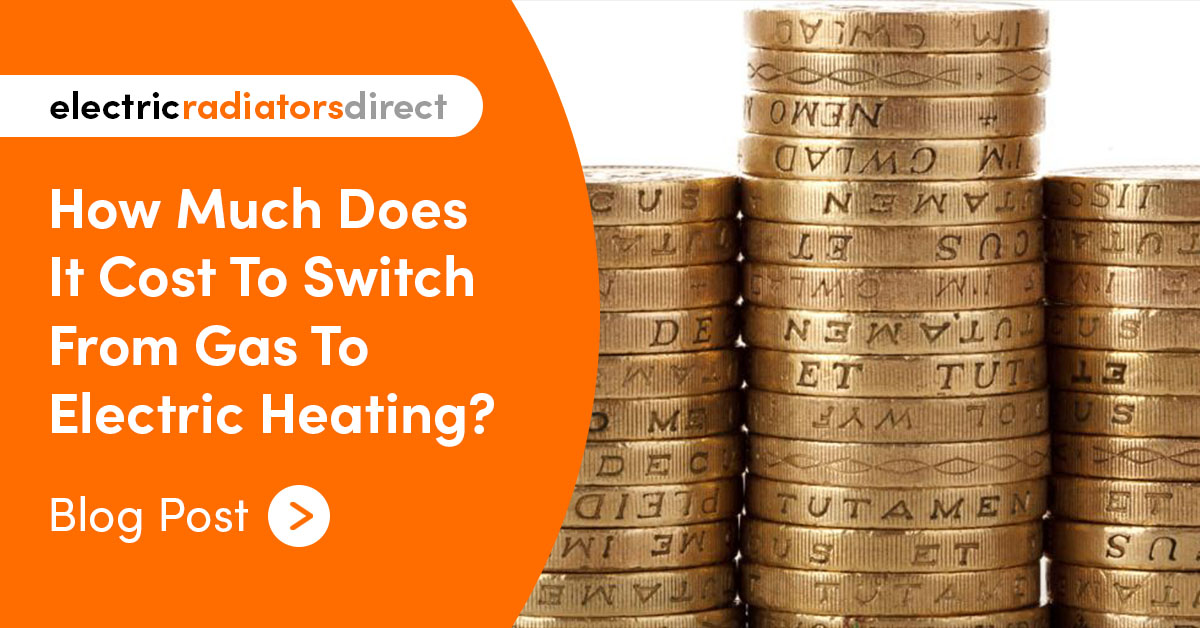

Last updated: August 2023
Thinking about switching from gas to electric heating, but not sure how much it’s going to cost? The price of removing your boiler, installation fees and energy bills are just some of the things to consider when it comes to changing the way you heat your home. We’ll be breaking down these costs, measuring efficient electric heating against conventional gas central heating – easing your transition to a greener alternative.
In this video, we’re telling you exactly how to go about making room for your new electric radiators, including how to install them, and all the benefits that come with making the switch.
How much does it cost to get rid of your gas central heating?
Changing from gas to electric heating means you’ll have to remove your existing gas central heating system. This includes getting rid of your gas boiler, pipes, and radiators. Hiring a Gas Safe registered engineer who can safely do the job is your first step. The overall cost will depend on several factors, such as the size of your house, the age of your boiler and how many radiators and pipes you have. It’s worth making enquiries with different Gas Safe engineers, so you can compare prices and discuss the specifications of your property. On average though, it’s an estimated £400-£800 to remove your radiators and gas boiler system.
How much does it cost to install electric heating?
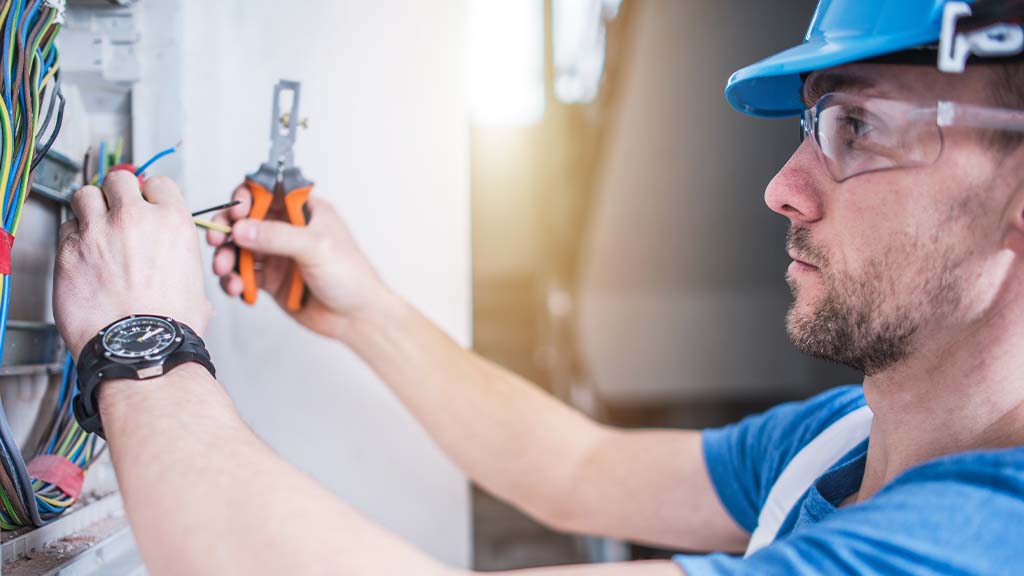

Hardwired
Electric heaters can be installed one of two ways. If you’re installing a heater in your bathroom or want your entire house kitted out with electric, we always recommend hardwired installation. This means hiring a qualified electrician to connect your heaters to the mains of your property, which is a relatively straightforward task that won’t cost you the earth. It will also safeguard your system from being overloaded. A full professional refit, including the cost of your heaters, could cost between £3,000-£4,000.


DIY
Alternatively, many heaters are DIY-friendly and take minutes to set up, so you can avoid expensive installation costs. Certain electric radiators only need to be attached to the wall and plugged into your nearest socket. A great way to save time and money, our heaters come with all fixtures and fittings included: follow the template provided, drill the holes and screw in the mounting brackets – your heater will then slot into place. Simple.
Is electric heating cheaper than gas central heating?
Many people end up paying more for gas due to outdated systems and poor energy efficiency in their homes.
It’s no secret that gas is cheaper than electricity per kWh, but running costs get more complicated when you dig a little deeper. For instance, many people end up paying more for gas due to outdated systems and poor energy efficiency in their homes. Plus, when you account for things like annual servicing and heat loss during the combustion process, the cost for gas adds up even more. So, while electricity is higher, you can offset this with their 100% efficiency at point of use and with the help of their in-built energy-saving features.
It’s no secret that gas is cheaper to run than electricity – but when you consider things like maintenance fees, heating zones and efficiency, running costs can actually tip in the favour of electric heating. Find out how with this short clip.
How much do electric heaters cost to run?
When it comes to calculating the running costs of electric heating, one thing you should always factor in is the wattage of your appliance. For example, if you work out how much it would be to run a 600W radiator for 4 hours, at a 34p unit rate, you can work out a rough estimate for a day’s use with this simple equation:


- 0.6kW x 4 hours = 2.4kWh
- 2.4kWh x 34p = 82p
Over a week, that radiator would cost £5.74, assuming it’s constantly working at maximum output. This is unlikely, with changes in weather conditions potentially throwing a spanner in the works. Plus, as electric radiators are designed for residual heating, chances are they may only be running for a few minutes every hour to keep the temperature topped up. So, whilst running costs can be useful in understanding energy usage, it’s important to consider all the factors to create a realistic figure.
Top Tip:
It’s also worth switching to a green energy provider that offers lower rates and provides you with cleaner electricity.
Working out a heater’s running costs isn’t totally straightforward, but we’re here to show you a simple calculation that can estimate how much you’re likely to spend.
How you can save money with electric heating
Electric heating is designed to be eco-efficient, meaning you can easily save energy and cut down your heating costs. Here are some of the ways electric heating can help you save money:
Low maintenance
Gas central heating requires an annual service check by a Gas Safe engineer. According to Checkatrade, this usually costs around £80 a year, a fee you’ll never have to pay with electric heating. There’s no pipework or risk of carbon monoxide leaks, so a yearly service isn’t necessary. No annual check means no annuals costs.
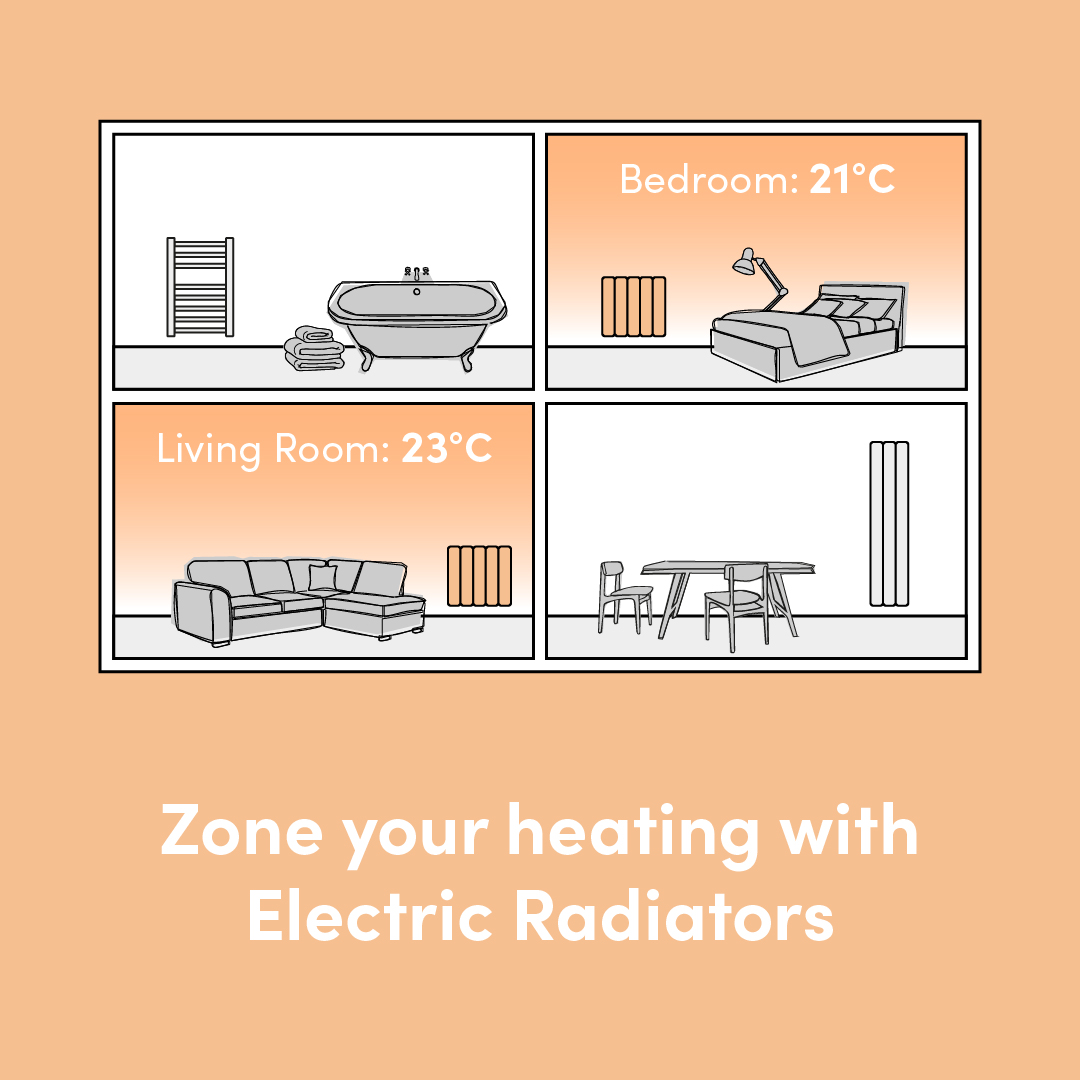

Zoned heating
Fitted with their own digital thermostats, electric heaters can be controlled on a room-by-room basis. Unlike gas, which utilises centralised control, electric allows you to manage your heaters individually, creating zones throughout your property to meet your needs. So, if you want to keep your bedroom cosy on an evening, you don’t have to heat the rest of your house at the same time. This reduces energy waste whilst keeping running costs on the low end. Learn all about zoning your heating here.
24/7 programming
Many electric heaters allow you to set up personalised heating schedules tailored to your routine. Offering a bespoke approach to heat management, this allows you to choose from a variety of temperatures and heating modes. Schedules can be adjusted in seconds, and you’ll never waste money or energy on rooms that aren’t in use. This energy-saving function can often be accessed manually or through an app on your phone, depending on the type of heater you choose – enabling you program your heating to perfection.
Smart control
Opting for smart electric heating is perfect if you’re looking to maximise controllability. Smart programming features make it much easier to monitor how and when you use heat, which could help you save energy, and money, in the long run. Some of these include:
App control


Electric heaters with WiFi control allow you to manage your heating using an intuitive app on your phone. Apps like Ecostrad Ecosystem enable you to make quick adjustments to your heating and access a range of energy-saving features even when you’re on the go.
Motion detection


This switches your heating on when it senses movement, like when someone enters the room. You won’t need to program your heating manually – this feature takes care of it. Perfect for busy, modern lifestyles.
Voice control


Compatible with Amazon Alexa and Google Home, this allows you to make quick temperature changes with voice commands, for hands-free management. A fast, effortless way to control your energy usage.
Energy usage statistics


This gives accurate temperature readings of your energy usage so you know where to make adjustments in order to save energy.
Our recommended smart electric heaters:
★ ★ ★ ★ ★
“I wanted a small compact electric radiator to provide background heating in a small home office. Very surprised just how efficient this small radiator has turned out to be. It is modern in style and was easy to fit onto a wall. It’s so good we are considering putting similar radiators into other areas of the house to supplement our main boiler run system. It also means that they all can be used during the day powered from our solar system.”
Customer bought: Ecostrad iQ Ceramic WiFi Controlled Electric Radiator - 500w
★ ★ ★ ★ ★
“The installation was incredibly easy and took less than half an hour from unboxing to having the unit on the wall. The radiator is easy to use, efficient and heats the room up very effectively. The intelligent function of the radiator means that the flat is always warm when it needs to be but the radiator isn't on when nobody is home. I would highly recommend this radiator and I will be buying more as I renovate my flat.”
Customer bought: Haverland Wi7 SmartWave Self-Programming Electric Radiator - 1100W


Make the switch with Electric Radiators Direct
Compared to gas, electric heaters have a variety of energy efficient features that will help you manage your heating system more effectively. With more control over your energy usage, you’ll be able to reduce running costs in no time. If you’re ready to upgrade your system, we have an extensive range of efficient radiators and infrared heaters that offer intelligent, energy-saving features. Use our handy radiator calculator to find the perfect size, or get in touch for a no obligation free quote and start cutting the cost of your heating bills today.
Key learnings
✓ The overall cost of getting rid of your gas central heating will depend on several factors: house size, boiler age, and the amount of pipes and radiators in your property.
✓ You should get your electric heaters professionally hardwired if doing a full refit or bathroom installation – this isn’t too costly. Many heaters allow for DIY-fitting for a quick and simple job.
✓ Electricity rates are currently more expensive than gas, but electric heaters run at 100% efficiency and can be paired with a renewable energy source and/or green energy provider for a reduction in running costs.
✓ Electric heaters come with cost-cutting and energy-saving features as standard: many of these work autonomously or can be adjusted via app/voice control for an even simpler approach to heat management.






